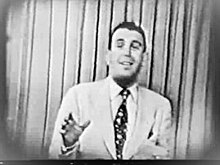
The DuMont Television Network was one of America's pioneer commercial television networks, rivaling NBC and CBS for the distinction of being first overall in the United States. It was owned by Allen B. DuMont Laboratories, a television equipment and television set manufacturer, and began operation on April 13, 1940.
Mary Kay and Johnny is an American situation comedy starring real-life married couple Mary Kay and Johnny Stearns. It was the first sitcom broadcast on a television network in the United States. Mary Kay and Johnny initially aired live on the DuMont Television Network before moving to CBS and then NBC.

Dennis James was an American television personality, philanthropist, and commercial spokesman. Until 1976, he had appeared on TV more times and for a longer period than any other television star. Alternately referred to as "The Dean of Game Show Hosts" and the "Godfather of Gameshows", he was the host of television's first network game show, the DuMont Network's Cash and Carry (1946).

The Wendy Barrie Show is an American talk show hosted by Wendy Barrie, which aired from November 10, 1948, to September 27, 1950.
The Magic Cottage was an American children's program broadcast on the now-defunct DuMont Television Network from 1949 to 1952.
Boxing from St. Nicholas Arena was an American sports program originally broadcast on NBC from 1946 to 1948, and later on the now-defunct DuMont Television Network from 1954 to 1956.
Newsweek Views the News is an American television program broadcast Mondays at 8pm ET on the DuMont Television Network. The series ran from 1948 to 1950.
The Vincent Lopez Show, also known as Vincent Lopez Speaking, is a 1949-1957 American musical television program hosted by Vincent Lopez and broadcast on the DuMont Television Network, and later on CBS Television. The latter title is a take-off on Lopez's introduction on his longtime radio show: "Lopez speaking!"
Doorway to Fame is an American talent show broadcast on the now defunct DuMont Television Network. The series ran from May 2, 1947, to July 11, 1949.

The Alan Dale Show is an early American television program which ran on the DuMont Television Network in 1948, and then on CBS Television from 1950-1951.
Camera Headlines was an early American television series that aired from January 1948 to 1949 on the DuMont Television Network.
Johnny Olson's Rumpus Room was a 1949-1952 American variety show hosted by Johnny Olson.
Ladies' Date is a 1952-1953 American daytime television series that was broadcast on the DuMont Television Network. The program was an afternoon variety/audience participation show, hosted by Bruce Mayer, who had been the host of a similar series locally in Detroit.
Highway to the Stars was an early American live television soap opera, which was broadcast on New York City station WABD, flagship station of the DuMont Television Network, from August to October 1947, at which point it was replaced with Look Upon a Star, itself eventually replaced with Camera Headlines in January 1948.
Know Your New York was an early American television game show. Broadcast on DuMont Television Network's flagship station WABD in New York City, the series aired in 1947, broadcast at 8:45pm ET on Wednesdays. The 15-minute series was sponsored by Bonded Auto Sales, and was hosted by Don Roper, who was assisted by Evelyn Peterson. Although broadcast only on a single station, it is notable as an early example of a television game show. The show returned to the air in 1971, with Dennis James as host, and ran for one season from 1971 to 1972.
All About Baby is an American daytime television series offering tips for mothers that aired from October 15, 1954, to July 1955 on several stations of the DuMont Television Network, including flagship station WABD.
Your Television Babysitter, also billed as Your TV Babysitter, was a daytime live television children’s series which debuted November 1, 1948, on the DuMont Television Network, and was hosted by Pat Meikle and created by her husband Hal Cooper.
Amanda is an American music television program starring Amanda Randolph that debuted on the DuMont Television Network on November 1, 1948. The ending date for the show is unclear, but it still appears in a TV schedule from October 1949.
The Needle Shop was an early American television program which aired on the DuMont Television Network in a 15-minute timeslot on weekday afternoons. The program was broadcast from New York City television station WABD from November 1948 to December 1949.




